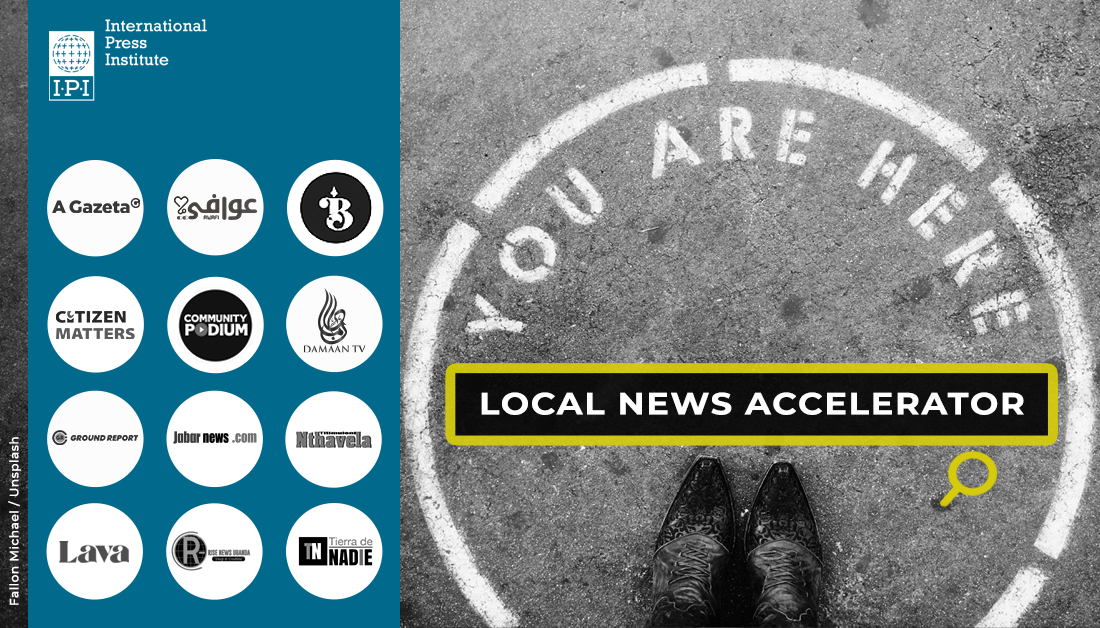IPI is excited to launch the Local News Accelerator, a three-month programme during which we will equip 12 media organizations with skills and strategies to grow their audiences and empower their teams.
A diverse jury selected the 12 organizations from almost 150 which applied for the programme.
The final 12 are serving local communities around the world from Ecuador to Zimbabwe, and they represent a range of business models, formats, and niches, with several focusing on health journalism or climate change coverage. They impressed our jury with their strong commitment to bringing local news to underserved groups, and they demonstrated the capacity to transform their businesses through audience research and product development.
IPI developed the Local News Accelerator in response to IPI’s research into local journalism, which has shown that local news is often on the frontline of disruption, and can be particularly vulnerable to financial and technological challenges. Local news is essential to strong democracies by filling information gaps in news deserts with quality, user-centric reporting, and IPI has seen great openness to innovation and successful models emerge from the sector.
We look forward to working with these 12 teams during the Local News Accelerator, and to sharing the lessons we learn together with our wider global network.
The 12 news organizations selected for IPI’s Local News Accelerator
Tierra de Nadie, Ecuador: In English, the name means ‘Nobody’s Land’. One of their projects is InvestigaciónDurán.ec, which focuses on conducting research about Durán, the city with the highest crime rate in Ecuador. The team also works on making these local issues relevant and accessible to a wider, national audience, and IPI will support them on growth and funding strategy, including promoting their investigative work and developing partnerships.
Citizen Matters, India: Citizen Matters reports on urban topics in three major Indian cities, and has already catalyzed change around government decisions and policies. They currently work with citizen journalists on hyperlocal issues and, during the accelerator, the team plans to develop an online forum to facilitate better communication of impact and stories between contributors and readers.
Proyecto Lava, El Salvador: a local solutions journalism outlet covering everything from mental health and education to food insecurity and how to build your own at-home garden. They joined IPI’s accelerator to work on building their business model and to explore and refine the ways they engage and create safe spaces with and for their community.
Ground Report, India: Ground Report aims to be India’s first hyperlocal news organization working on climate change issues, through stories showing the impacts of climate change in remote parts of the country. During the Local News Accelerator, they will work with IPI to get the fundamentals of their business model in place, including a tech stack, revenue strategy, and organizational structure.
Bollo.id, Indonesia: Bollo reports on environmental issues with a focus on eastern Indonesia; much of their reporting covers mining in the region and its effects on women, children and marginalized groups. Founded in 2022, the organization will focus on defining and listening to its audience and building a business model.
Jabarnews.com, Indonesia: Jabarnews.com provides fact-based information online and through social media platforms. Through the accelerator they will develop ‘Jurnal Desa’, a programme that highlights rural issues with the aim of influencing policymakers and improving life in these regions.
Damaan TV, Pakistan: Damaan TV provides local news coverage on topics including human rights and climate change for the 2.7 million residents of the southern districts of Pakistan’s Khyber Pakhtunkhwa province, which is underserved by traditional media. With IPI’s support, Damaan TV hopes to develop a network of local citizen reporters in hard-to-reach regions, and to carry out audience research on their path to sustainability.
Nthavela Newspaper, South Africa: Nthavela has been serving the Limpopo province for the past 15 years, promoting the local Xitsonga language through their reporting. During the accelerator, the team will focus on improving their skills in digital business models and diversifying their revenue streams.
Rise News Uganda Network, Uganda: In-depth, people-centered and impactful journalism is at the heart of this network, which tackles under-reported issues affecting local communities in Western Uganda, with a particular focus on the LGBTI community. IPI will support them in developing an anti-disinformation project that aims to engage other media and local communities as they develop a network of local media in the region.
Awafi, Yemen: Awafi covers health news in Yemen, including fighting disinformation and misconceptions linked to health, and the organization has a focus on empowering women. With the support of the accelerator, they will develop their business and organizational plan to increase their audience engagement and work towards sustainability.
Community Podium, Zimbabwe: Community Podium is a non-profit participatory media organization aiming to provide a space for the voices of ordinary people and marginalized communities to be heard, focusing on the rural areas of southern Zimbabwe. They work with citizen journalists whom they train in reporting and media literacy, and the Local News Accelerator will help them improve their skills in newsroom management and content packaging.
A Gazeta, Brazil: A Gazeta is the longest-running news organization in the cohort, founded in 1928 to serve the audience of Espirito Santo and its 4 million residents. They have already switched to a digital-first way of working and IPI will help them adapt their business strategy to this new reality and ensure that they can maintain their commitment to the needs of local users.
What next?
The 12 newsrooms have begun their programme of one-on-one and group coaching and speaker sessions to start building their skills in newsroom management and audience engagement. They will also take part in intensive training on key skills such as journalism formats, design thinking, and digital business models.
Over the next three months, IPI will share regular updates and lessons learned from the newsrooms taking part. To keep up to date with this and other innovation programmes by IPI, sign up to our media innovation newsletter.
The next event we are hosting which is open to all media practitioners is a virtual visit to The Public Source on Monday, October 30 at 15:00 CET. Anyone working in media is welcome to join the call on Zoom to hear from the Beirut-based team about how they sustain their work in the polarized Lebanese media landscape.
If you have questions about the incubator or IPI’s innovation work, please email [email protected].
IPI’s Local News Accelerator is made possible with support from the Friedrich Naumann Foundation.



